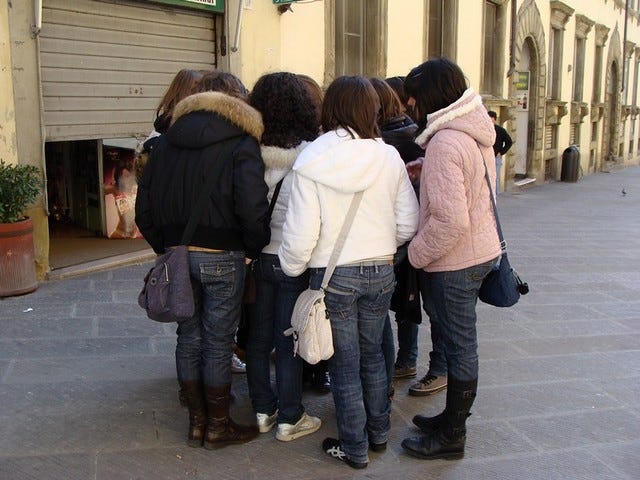Millennials Like Traditional Religion

Monica Arellano-Ongpin, source, CC-BY 2.0
In 2005, Christian Smith published his work Soul Searching: The Religious and Spiritual Lives of American Teenagers. He interviewed teenagers across the USA to get a sense of their religious life. He found that very few teenagers are seekers or are spiritual and not religious. In fact, the opposite tends to be true. Teenagers are part of traditional religious communities.
Smith explains:
Very, very few American adolescents appear to be caught up in the much discussed phenomenon of "spiritual seeking" by "spiritual but not religious" seekers on a quest for higher meaning. Neither Joy nor Kristen, nor most teens we interviewed, had even heard of the expression "spiritual but not religious," much less knew what it meant. Contrary to popular perceptions, the vast majority of American adolescents are not spiritual seekers or questers of the type often described by journalists and some scholars, but are instead mostly orientated toward and engaged in conventional religious traditions and communities. (27).
The situation in 2017 may be different than when Smith wrote in 2005. But experience tells me that it is not. Of course, everyone knows a spiritual-but-religious person. But the majority of people that I know of are not spiritual seekers. They are either traditional religious adherents or those who are not very religious---however they define that.
The Pursuit of Seekers
Churches in North America spent so much time orientating their services to meet the needs of seekers. To some degree, this was a good idea. Churches updated their worship services to engage and to invite seekers into their church. As a consequence, many North American churches today continue to practice these seeker orientated models of doing church, perhaps without even knowing it. They have become traditional!
The ironic thing, then, is that many churchly traditions are new-traditions of only 25 years. When the church has existed for two millennia, these young traditions should be taken with a grain of salt. And a number of these young traditions emerged as ways to engage with seekers: 1990s style music, vision statements, simpler preaching, etc.
Current churchly traditions are sometimes, then, just the tradition for the last few decades, but nobody wants to change them because they are simply the way things are. For example, music styles in churches are something of a sacred thing. If a church practices one style of music and someone changes that style of music, then the change is tantamount to denying the faith! Okay. That's a bit extreme. But you get my point.
Maybe I've missed misidentified the specifics of seeker-friendly church services. I am partly recounting what I've seen with my eyes in churches, and I assume that at least some of these things are purposed to engage with seekers. And what a great emphasis that was. Christians should think carefully about how to engage with people who seek God and the faith. I am not critiquing the desire to reach people for Christ!
Millennials Want More
But I am critiquing the validity of reaching people through seeker orientated models today because millennials are not looking for a slick vision statement, pop music, and simple tips for life. They want something with more substance, something that feels old and sturdy. If Smith is right (the quote at the beginning), then this may have always been the case.
In my context, I've noticed a trend where young evangelicals are pursuing high church experiences such as is found in Anglicanism with its more sacramental emphasis. But even Baptist churches are returning to a liturgical tradition.* They recognize that faith needs practice not just a notional assent. I've also heard a report that Orthodox churches are growing in my area, presumably part of this growth comes from young persons. Actually, I recently learned of two Canadian Reformed churches in my area that are growing and full of millennials.
James Smith's Cultural Liturgies series defines what many people inwardly experience today. Smith argues that all people buy into some kind of liturgy, whether it's the liturgy of consumerism of traditional Christianity. Young evangelicals are perhaps intuitively understanding that we all have cultural liturgies and have become unsatisfied with surface-level faith, which seems closely aligned with the cultural liturgy of consumerism. They appreciate genuine Christian communities that they encounter, which are full of believers who love God and others in practical ways.
The reality is that young persons don't want fluff. They don't want an entertaining faith. Netflix, the arts, and whatever else are going to be way more entertaining than the church could ever be. There is no way the church can keep up with our culture of pleasure. And that's okay.
Conclusion
We are not called to entertain people. We are called to invite people into a deeper relationship with God through Jesus Christ. In fact, calling people to deep, traditional faith is how to attract seekers. If you offer up entertainment or worship that adapts to what's cool in the present, you will almost always lose to the culture around us and you will also lose millennials who are seeking a deep, traditional encounter with God.
*Liturgy is not good in itself. But the traditional practices of Christianity like baptism, the Lord's table, and communal prayer are important and link us to the past.




